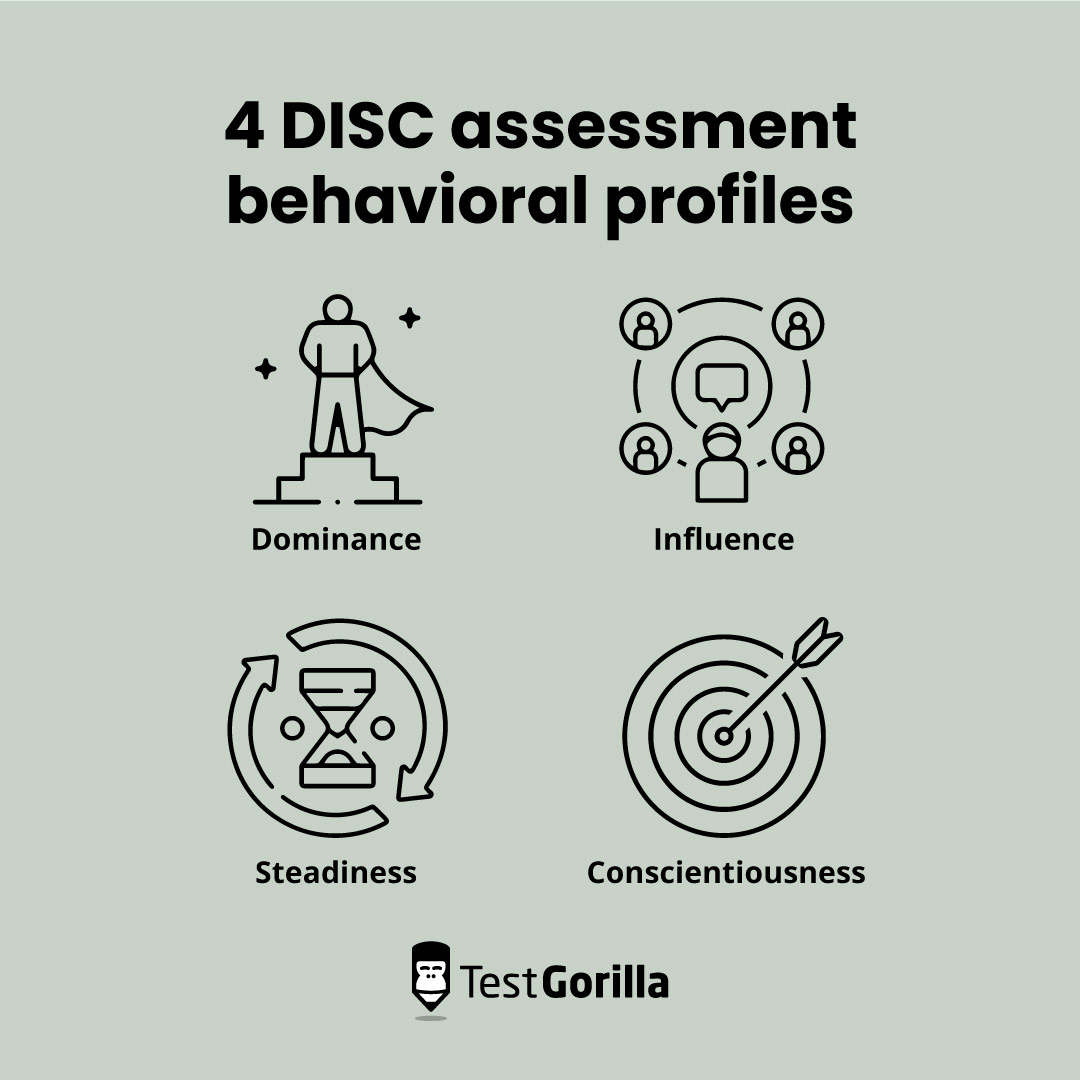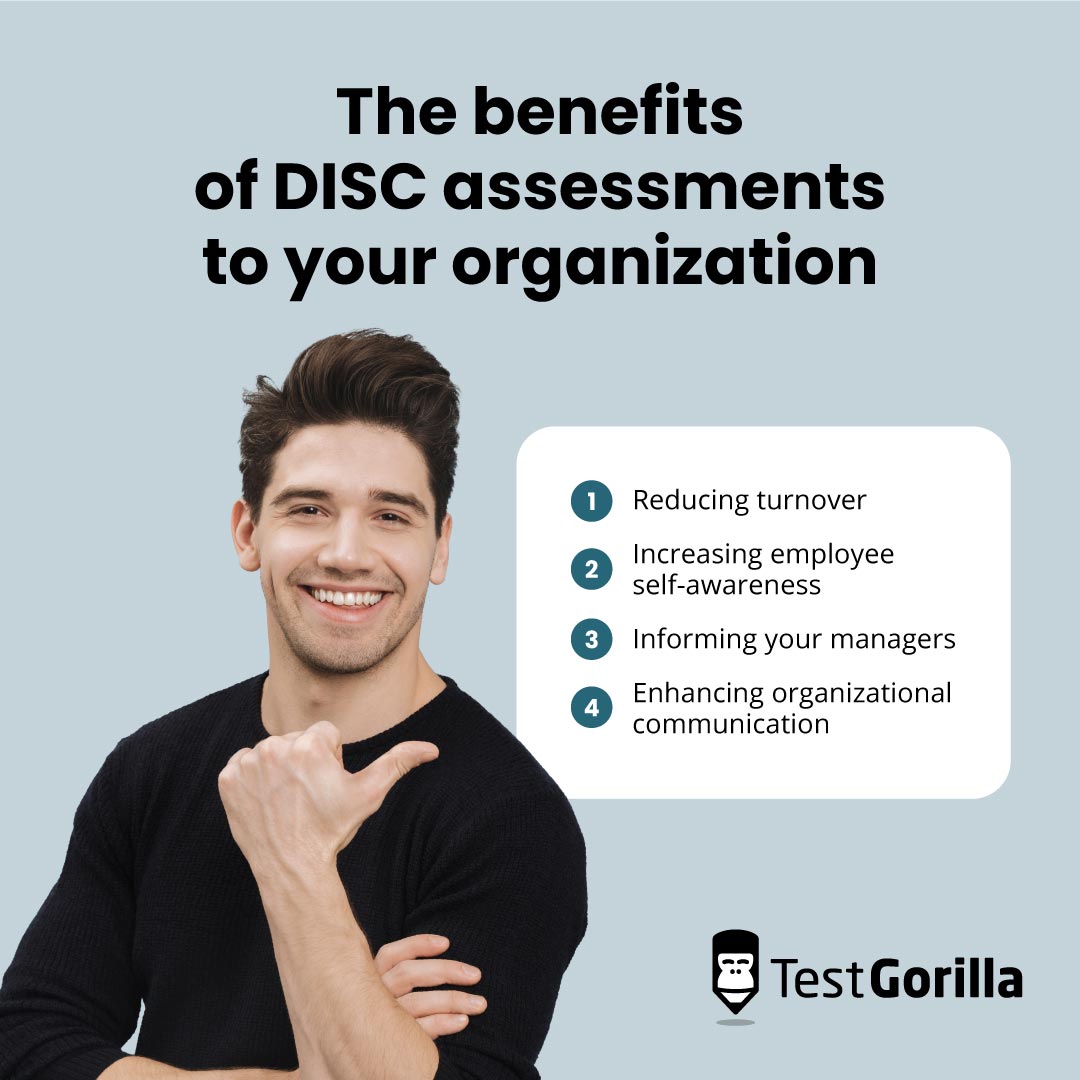Identifying which candidates have the right type of skills for your job opening is crucial to making a great hire. But what about the right type of personality?
Although no single personality type is better or worse than another, it can be tricky to identify which candidate’s values and behaviors align with your organization’s or which candidates will make strong leaders.
That’s where DISC assessments come in handy.
But what is a DISC assessment exactly, and how will it benefit your company, even beyond the hiring process?
This article explores the ins and outs of the DISC assessment, why it’s important to your recruitment process, and the effective ways to implement it.
Table of contents
What is a DISC assessment?
A DISC assessment is a behavioral profiling tool that measures individuals’ personality traits and behaviors. DISC assessments are commonly used in pre-employment screening to understand how candidates will behave within an organization.
The DISC assessment’s history begins with the DISC behavioral model. Dr. William Moulton Marston, a Harvard psychologist, first proposed the model in his 1928 book Emotions of Normal People.
Marston aimed to explain how an individual’s emotional state and behavior can influence group interactions in everyday life. He identified Dominance, Influence, Steadiness, and Compliance as the four primary personality traits that predict human behavior.
Industrial psychologist Walter V. Clarke created the first DISC personality assessment in the 1950s.
In the 1990s, Inscape Publishing updated Marston’s model into the self-administered test used today. One notable update was that “Compliance” became “Conscientiousness,” which emphasizes a person’s value of accuracy and precision.
While other pre-employment screening assessments focus on role-specific skills and competencies, DISC assessments evaluate how candidates communicate and collaborate within an organizational framework.
Let’s say a candidate performed well on a job-specific skills test, but you want to know what motivates them and how their personality will impact the other members of your team. A DISC assessment will help answer these questions and inform how to adjust your management style to their personality type.
That said, you should never use a DISC assessment as the determining factor in your hiring decision. DISC assessments, like all personality tests, should be used alongside other tests to avoid bias in the recruitment process.
How DISC assessments work
DISC assessments are usually completed online and shouldn’t take more than 20 minutes to complete.
TestGorilla’s DISC assessment, for example, presents candidates with 48 statements they rank based on how strongly they agree or disagree.
For instance, a DISC assessment statement could be, “I can handle only one task at a time.” A candidate will respond with a rating between one and five.
In a DISC assessment, personality type refers to the four different behavioral categories, or styles, that candidates can fall under: D for Dominance, I for Influence, S for Steadiness, and C for Conscientiousness.
Dominance
People who fall under the Dominance category are typically self-assured, outspoken, and like to take action quickly.
They aren’t afraid to confront challenges, and their behavior can be direct, assertive, and commanding.
Those with Dominance personality types may need to improve their attention to detail and tolerance of others’ opinions and workflows.
Influence
These individuals try to influence their environments by cultivating relationships. They’re often collaborative and outgoing, and place trust in their colleagues.
They don’t want to be ignored or lose influence and can have difficulty seeing tasks to the finish line.
Steadiness
Those with a Steadiness style seek cooperation, support others, and want to take their time with tasks and projects.
They’re humble leaders but don’t always react well to change or conflict.
Conscientiousness
Individuals with a Conscientiousness style value expertise and objective reasoning when working within existing frameworks.
They’re detail-oriented, stable, and unwavering in their leadership. However, they may have trouble delegating tasks and accepting criticism.
Finding a candidate’s DISC style
In the recruitment process, candidates take the DISC assessment by ranking a series of statements based on how much they agree or disagree. Their responses help identify which personality “styles” they may fall under.
Candidates’ behavioral patterns determine their personality style. For example, a person with a Dominance personality style tends to display confidence and is motivated by success.
After candidates finish the assessment, it’s time to interpret the results of their DISC assessments to find out their DISC style.
There’s a range of responses that a candidate can have to different statements, so there’s a good chance they’ll have a combination of personality style outcomes.
The DISC assessment process has 12 potential outcomes. Each provides different details about how candidates respond to challenges, goals, and working within a team.
DISC style | These candidates are… |
High Dominant style | Goal-oriented, motivated to succeed, and work well independently. |
Dominant/Influential style | Goal-oriented and enthusiastic about influencing their colleagues. They enjoy opportunities to perform but may overpower other team members. |
Dominant/Conscientious style | Driven to succeed but can also be perfectionists. They tend to have high standards for themselves and others, which can negatively impact their communication. |
High Influential style | All about the team. Their main goal is to cultivate a strong network of relationships but can struggle to be objective. |
Influential/Dominant style | Driven to make the most of every opportunity. They can be charismatic but not always the best listeners. |
Influential/Steady style | Empathetic and personable with their colleagues. Although they’re quick to support others, they tend to avoid confrontation or share criticisms. |
High Steady style | Collaborative and enjoy supporting their colleagues. However, their reliance on others for validation and direction can drain their self-confidence. |
Steady/Influential style | Patient and supportive of their team members but conflict-averse, which can result in a lack of directness. |
Steady/Conscientious style | Diplomatic and value predictability in the workplace. Rather than blaze their own path, they prefer to avoid uncertainty and are hesitant to lead. |
High Conscientious style | Analytical and approach situations logically. Accuracy is their main priority rather than creativity, and they can struggle with sustained empathy for their colleagues. |
Conscientious/Steady style | Detail-oriented and prefer clearly defined tasks and responsibilities. Their fondness for order can make them inflexible. |
Conscientious/Dominant style | All about results. They’re determined to make changes to boost productivity, which can result in a strict leadership style. |
Regardless of your candidate’s DISC style, it’s important to identify your existing organizational values and the different personalities of your current employees.
This will allow you to learn how your candidate behaves and how that behavior will impact your organization.
The company-wide benefits of DISC assessments
Understanding how your candidates behave will benefit your recruitment process and your organization.
The benefits of DISC assessments to your recruitment process
DISC assessments will improve your hiring process by:
Providing data to inform decisions
DISC assessments – and other pre-employment tests TestGorilla’s extensive library – give recruiters measurable and comparable data to make a great hire.
Instead of taking a candidate’s word regarding their motivation and attitude, the DISC assessment reveals how a candidate actually behaves.
But remember to use more than one kind of pre-employment skills test before reaching a hiring decision.
Eliminating bias
DISC assessment data also eliminates recruiters’ unconscious bias in the hiring process.
Instead of making assumptions about a candidate’s personality from their resume or cover letter, recruiters can use the DISC assessment to evaluate candidates’ behavior objectively.
Giving you more information about candidates
The DISC assessment gives you more valuable information about the candidate’s personality type, and you may decide a certain personality style fits an open role better than others. For example, you may prioritize a candidate with an Influential/Steady type because they’ll likely exercise more empathy with customers.
Shortening time-to-hire
DISC assessments will reveal top talent more quickly during the recruitment process, which boosts hiring speed.
Once your recruiters fill your vacancies quickly, they can move on to other hiring responsibilities, saving time and resources for your business.
The benefits of DISC assessments to your organization
DISC assessments are more than just recruitment tools. They offer other tangible benefits to your organization like:
Reducing turnover
Research shows that 82% of employees want their employer to see them as a person.
Employers can meet this demand by identifying employees’ behavioral patterns with DISC assessments and putting them in positions to succeed. Supporting employees in this way will help reduce turnover and keep your organization humming.
Increasing employee self-awareness
Your employees’ personality types shouldn’t be a secret. They’ll benefit from the results of their DISC assessments by being more aware of how their behavior impacts their individual and team performance. They can learn the areas where they thrive and where they could use some improvement.
Informing your managers
DISC assessments will give your managers the information they need to monitor and support team members.
By understanding how individuals behave, your managers can build teams with complementary personalities and assign tasks to employees with specific strengths.
Enhancing organizational communication
DISC assessments place employees and managers in situations where they must communicate their feelings, motivations, and attitudes about certain subjects.
More communication within your organization means more team cohesion and productivity.
How to roll out DISC assessments
Now that you understand what a DISC assessment is and how to take advantage of its benefits, let’s look at how to implement them.
Identify which personality types your business needs
The most important step in the DISC assessment process is understanding which personality types will advance your organizational goals and which will require some improvement.
For example, say your organization has an excess of Dominance personality types. You might consider prioritizing candidates with more Steadiness attributes, like patience and cooperation, to balance your teams.
Use TestGorilla’s DISC Personality test
TestGorilla’s DISC Personality test asks candidates to conduct a self-evaluation by ranking 48 statements on a five-point scale where 1 = very inaccurate and 5 = very accurate.
Depending on candidates’ behavioral preferences in the DISC model, they’ll either fall into one of the four categories or a combination.
The test is available in seven languages and takes less than 10 minutes to complete. Recruiters can use it for any role they’re hiring for - entry-level, mid-level, or senior-level.
Since DISC assessments can be completed remotely, all candidates have to do is accept an invitation to complete the assessment and rank each statement honestly.
It’s also important to note that there are no wrong answers! For example, High Dominant candidates aren’t better or worse than High Steady candidates.
Once candidates complete the assessment, TestGorilla gathers the results into a comprehensive report that describes:
Their personality style
How they behave in personal relationships
How they behave at work
Their best attributes
Their main challenges
The report also offers tips for how to best communicate with particular personality styles to help them achieve their potential at work.
Implement assessments early
DISC assessments are most valuable to your recruitment efforts when you use them early in your hiring process.
You don’t want to wait until the very end of your hiring process to DISCover that your candidate can’t work well with others, for example, or lacks the confidence to lead if these are integral to the role.
Compare results
You should always compare the results of your DISC assessments to see which candidates align with your organizational values and priorities.
For example, let’s say you’re deciding between two finalists for an open role. They both have relevant skills, but one candidate values building relationships more than the other. That information may put the candidate over the top in your decision-making process.
Use DISC assessments to bolster your recruitment process
DISC assessments identify candidates’ behavioral attributes that may or may not benefit your organization. They also make it easy to understand a candidate’s unique personality by categorizing them based on their responses.
But the benefits of DISC assessments aren’t limited to recruitment. They also benefit your existing workforce by reducing turnover and increasing employee self-awareness and communication.
Sign up for your free TestGorilla plan and learn more about the personalities in your talent pool and existing workforce.
Related posts
Hire the best candidates with TestGorilla
Create pre-employment assessments in minutes to screen candidates, save time, and hire the best talent.
Latest posts
The best advice in pre-employment testing, in your inbox.
No spam. Unsubscribe at any time.

Hire the best. No bias. No stress.
Our screening tests identify the best candidates and make your hiring decisions faster, easier, and bias-free.
Free resources
This checklist covers key features you should look for when choosing a skills testing platform
This resource will help you develop an onboarding checklist for new hires.
How to assess your candidates' attention to detail.
Learn how to get human resources certified through HRCI or SHRM.
Learn how you can improve the level of talent at your company.
Learn how CapitalT reduced hiring bias with online skills assessments.
Learn how to make the resume process more efficient and more effective.
Improve your hiring strategy with these 7 critical recruitment metrics.
Learn how Sukhi decreased time spent reviewing resumes by 83%!
Hire more efficiently with these hacks that 99% of recruiters aren't using.
Make a business case for diversity and inclusion initiatives with this data.



















